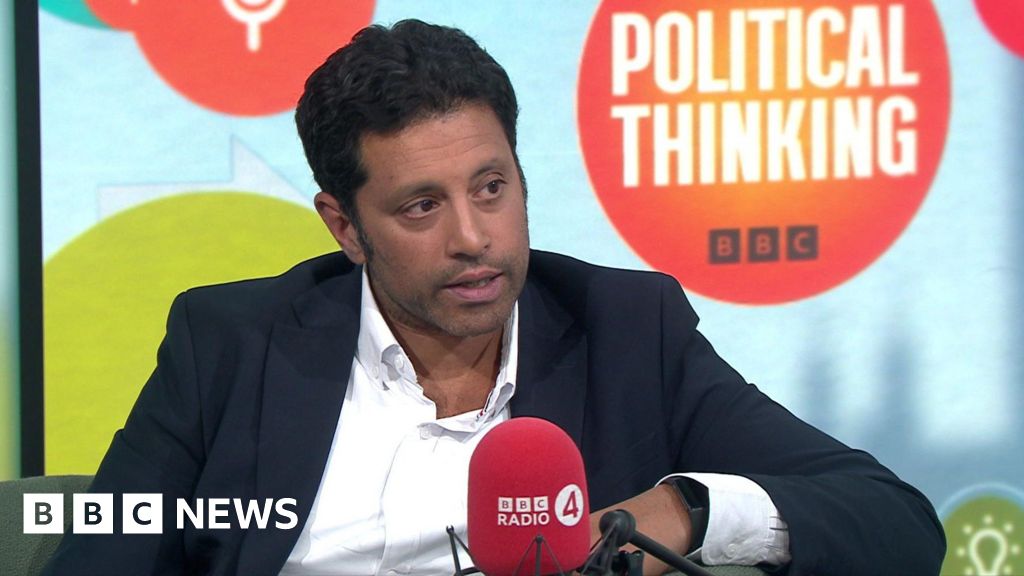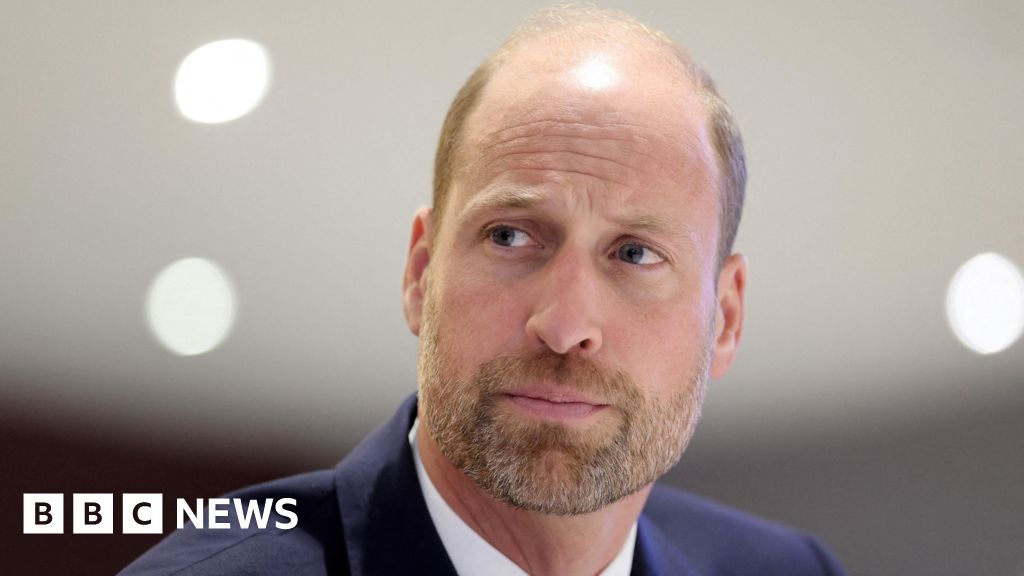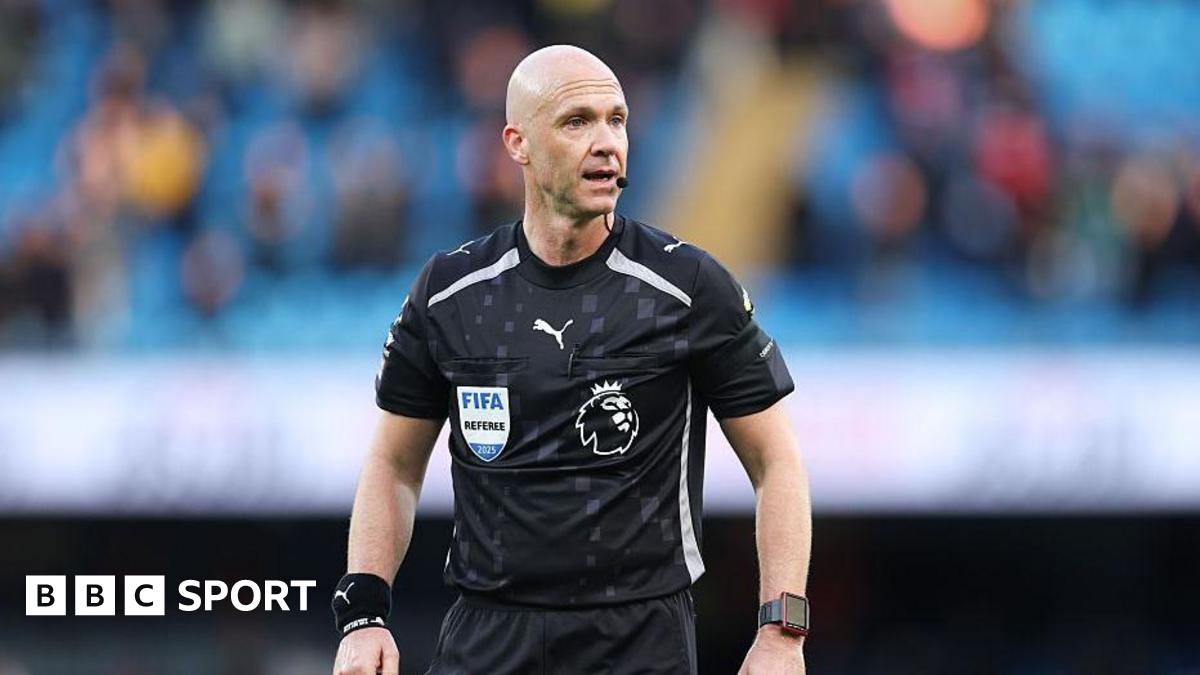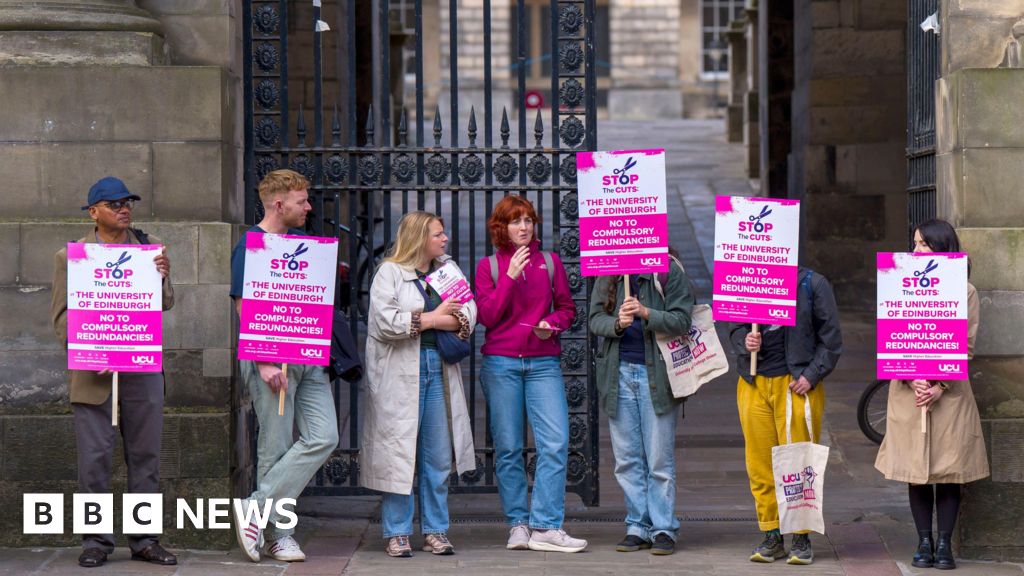Billy Kenber
Politics investigations correspondent
Phillip Kemp
Political reporter

 Getty Images
Getty Images
On a cloudy Tuesday in September last year, Gawain Towler, a veteran press chief for Nigel Farage's various political parties, was working in Reform UK's central London offices when his phone went calling him into a meeting.
He was being given the sack.
The decision had been made by Zia Yusuf, the then newly-appointed Reform UK chairman with a mandate to professionalise the party.
But although multimillionaire businessman Yusuf was sitting close to Towler in the party's office, it was delegated to Reform's chief operations officer to ring him and then deliver the news in an adjoining room.
After 20 years working for Eurosceptic causes, he was given just a few minutes to clear his desk and leave.
"My nose was a bit out of joint for a few hours," Towler told BBC News. "It was a surprising way of doing it."
He wasn't the only Reform employee or supporter who found themselves at odds with Yusuf's way of doing business during the 38-year-old's 11 months in charge.
When Yusuf abruptly quit as party chairman last week, Farage acknowledged that the former banker's "Goldman Sachs-like mentality" meant some people found it difficult to work with him.
"Zia worked very hard but struggled with relationships and people," wrote Arron Banks, a former Reform mayoral candidate and ally of Farage, in a post on X.
"Quite often businessmen come into politics and they assume that politics works the same way as business and you can work people really hard in business because you're paying them well," Towler said.
A lot of those in Reform, however, were volunteers.
Others were veterans of Eurosceptic politics who were used to being left to do their work without having to "constantly" report back to Yusuf.
The now ex-chairman acted with a "brutality that a volunteer organisation which is based on personal relationships sometimes finds difficult," Towler added.
"And there were a lot of people's noses [which] were put out of joint. We give up our free time, we do all this and we're still treated like dirt.
"There was drive and commitment and passion. But there was very little empathy and sympathy and you need that too."
Yusuf denies this and says that his success as Reform chairman has led to people bearing grudges.

 Getty Images
Getty Images
Former Reform UK press officer Gawain Towler walks among tractors parked along Whitehall during a farming demonstration
Before he was Reform's chairman, Yusuf was the co-founder and chief executive of a luxury concierge business offering travel bookings and once-in-a-lifetime experiences to a wealthy elite.
That business, Velocity Black, was sold for a reported $300m (£221m) to a US bank in 2023, giving Yusuf the riches which allowed him to donate a six-figure sum to Reform and work as party chairman on an unpaid basis.
But former employees of Velocity Black speaking to the BBC have said some of the issues - his controlling, sometimes domineering behaviour, a lack of empathy and harsh sackings of staff - had direct echoes of how he behaved running the concierge company.
His abrupt departure - and two days later, return as head of Reform's council spending-scrutinising 'Doge' unit - even had parallels with a break, and swifter-than-expected return, as CEO of Velocity.
At Velocity, concerns included his unpredictable behaviour which meant people "lived in fear", a complaint from a female ex-employee alleging inappropriate conduct, and a failure to take others into account, epitomised by unhygienic office conditions caused by Yusuf allowing his dog to defecate on the carpet.
Some questioned whether Reform had asked questions about Yusuf's time running Velocity Black and whether his issues with people could have been foreseen.
"We were all in complete disbelief [that he went into politics]," one ex-employee said.
Like others in this article, they didn't want to be named publicly because they still work in related industries.
"It is the most absurd thing to see…a person with that history choose to be on the public stage."
"I was frankly quite shocked," another said. "How does one make the jump from being a very kind of gauche CEO of a ridiculous concept ultimately to being incredibly high up in a major political party in one of the biggest democracies in the world. That seemed like a major jump."
Demanding boss
With its sale to Capital One in 2023, Velocity Black earned tens of millions of pounds for investors and shareholders and became a glittering success story for its two founders, Yusuf and former school friend Alex Macdonald.
Like many tech start-ups, however, its journey there was rocky at times.
The business started as a mobile payment app, driving diners to restaurants and allowing them to pay the bill from their phones.
Within a couple of years, it had pivoted to offering travel bookings and experiences like swimming with orcas and dining in the Egyptian pyramids.
Some of those who worked with Yusuf saw him as a "visionary" and an "absolute force of nature" who was particularly adept at raising money from investors.
But more than half a dozen former Velocity employees told BBC News that Yusuf was difficult to work for and lacked leadership skills.
They paint a picture of a flawed character who could be extremely demanding, even by the exacting standards of a fledgling tech start-up. As they would be when he was running Reform, firings were frequent and brutal.
"Zia is one of the most challenging people I've ever worked for," one said.
"Everyone was on edge constantly, he was very curt," a second ex-employee said. "He led from fear."
"He had zero empathy," they added. "It was a pretty toxic environment."

 PA Wire
PA Wire
Former chairman Zia Yusuf with Reform UK's new chairman David Bull
A third employee who worked closely with him said he pushed people "to the absolute limits".
"People were emotionally and psychologically affected but it wasn't always the workload, it was the sheer unpredictability of Zia's behaviour and people lived in fear of him," they said.
Yusuf would lambast employees in the office and sometimes in front of wealthy members of the business's concierge service at Velocity Black events.
At least one employee said they never received a formal written employment contract and many left just months after joining the company.
"He doesn't interact with people in a 'regular' way and he doesn't understand 'regular' interaction," another said.
They pointed to an online review of Velocity as reflective of their own experiences. It states that "at the beginning you truly believe you have joined the next Tesla… It is quite simply the worst company I have ever worked in".
One employee said Yusuf was an "excellent salesman" who recruited her on a premise which turned out to be far from the reality.
"He courted me [for the role]. Took me out to dinners. It was all very exciting."
But when she started it wasn't what she thought she had signed up for.
"It very quickly became apparent the façade, the charismatic salesperson, was no longer there.
"He just seemed very go go go go go and money was no object. He would get angry if things didn't work out the way he wanted them to work out."
As he would as Reform chairman, Yusuf worked punishing hours, seemingly to the point of exhaustion.
In 2017, Velocity's board agreed that he could go on a break and employees weren't sure if he would return. In the end, he returned a few days later.
One former employee disliked Yusuf's approach to business so intently he said he didn't exercise his stock options and had no regrets about doing so, despite missing out on a potentially six-figure profit.
"It left such a bad taste," they said. "The moral culture, [Zia's] lack of empathy.
"It showed bad people can win."
While several former employees were highly critical of Yusuf, others were more positive about their experience of working with him or some of his qualities.
One described him as a "brilliant boss" from whom they had learnt a lot. Another said he was an "absolute powerhouse" who was always respectful.
Several employees who criticised his conduct acknowledged he was a powerful and persuasive speaker who was adept at securing multiple rounds of investment in the business.
Despite his hard taskmaster approach, "likeability was important to him", one former employee said.
Velocity was a small company where employees told us they were reluctant to raise formal complaints because they feared they would invariably make their way back to the chief executive.
In 2018, a female employee told colleagues she received a series of late night phone calls from Yusuf which she did not answer.
She told them they had made her uncomfortable and she raised them with Yusuf's co-founder, Macdonald, the next day, asking if she could work from home because of the "Zia issue".
Macdonald said his co-founder had explained that the phone calls were in error and he had been trying to call someone else. Yusuf said he does not recall this, and that the company ran a 24/7 customer service operation so it was not unusual for employees to be called at night.
In June 2019, several months after her departure, the same woman wrote to Macdonald to complain that Yusuf was repeatedly trying to follow her personal Instagram account, despite her rejecting the request each time.
She said she had already blocked him on the messaging service WhatsApp.
She warned she would take it further if it continued and suggested others had been contacted in the same way.
BBC News has seen messages between employees suggesting that another woman who had recently left Velocity Black said they had experienced similar requests on social media.
Through lawyers, Yusuf said the accusation was false and that he had employed someone to manage his social media accounts during that period.
This man was put in touch with a BBC reporter by Yusuf's lawyers. He said Yusuf paid him to post content and occasionally follow people through the accounts, all at Yusuf's direction and with his approval.
He said he was not employed by Velocity Black, didn't know anyone else at the company, and did the work as a paid hobby.
He said any repeat requests would have been inadvertent and claimed that while Yusuf had retained access to his accounts during this time, he did not use them.
Celebrity-studded parties
Velocity Black had offices in Mayfair in London and in several American cities.
During the early period after the company's US launch, Yusuf moved to New York.
He lived in a five-bedroom double-height loft apartment owned by Sir Winston Churchill's granddaughter.
It cost $8,000 a month, paid for by Velocity Black with the board's approval.
Reflecting on its grandeur, one former staffer recalled how "this place had columns". Yusuf said it was also used as an office by Velocity employees.
Several employees said they thought the spending was excessive and a bad look for a cash-strapped start-up trying to build a viable business.
The company spent lavishly on celebrity-studded parties designed to build the brand.
In 2017, it flew several supermodels for a party at a private villa in Mykonos, with other events including a Halloween party at the Mandrake Hotel in London and pool parties in Coachella, California in 2019.
Although one senior source said Yusuf disliked the events and found them very stressful, others thought that being in the same room as stars was important to him.
"He was very enamoured by celebrity, very enamoured by being seen, being the guy, being viewed as cool," one ex-employee said.
Yusuf liked to dress in designer clothing and owned a number of sports cars including a Porsche and a Ferrari.
For months, these were kept in a car park at Westfield shopping centre in west London, with Yusuf racking up significant fines in the process, staff said; he said he had no recollection of this and denied living a lavish lifestyle.
Employees joining the company were struck by how attractive staff members were, to the extent it appeared to them to be a recruitment strategy, something Yusuf denied.
"Everyone looked like a model but that made sense as a high-end concierge company. It was never written that you had to be ridiculously attractive," a former staff member said.
Yusuf could be a chaotic boss. He worked long hours meaning at times he was "basically living in the office".
"The environment was like a playground without any real senior people - fun but without a real structure," one ex-staffer said.
Yusuf's actions sometimes betrayed a lack of regard for those around him.
One day in 2018, he bought a husky puppy called Apollo. He would bring it in the office and leave other staff to deal with it, on one occasion leaving it there overnight.
The dog was untrained and would run around the office and defecate on the carpet, with Yusuf seemingly unwilling to pick up the faeces, ex-employees told BBC News.
Some staff members found it so unpleasant they wrote about it on Glassdoor, an online website which allows employees to anonymously review their employers. At least one post on the site about it appears subsequently to have been taken down.
One wrote: "Dog faeces in the office every day, it is unsanitary and smells disgusting."
Under a section headlined "advice" they wrote: "Ban the dog, get the office cleaned."
Eventually a small office was turned into a room for dogs, including those other employees were then allowed to bring in.
Yusuf's own flat near Paddington "smelt of dog poo" according to two sources who visited. They could see dog faeces left on the carpet in the property.
Messages indicate that on one occasion in September 2018 his dog was left in an outdoor space at his London flat for several hours and sounded distressed, raising concern among his neighbours.
Yusuf disputes this and said that his dog was occasionally in the office, but it would be taken outside. He denied that he left it there overnight.
Entering politics
By 2021, Velocity Black was growing fast. That year, it was listed as the 18th fastest growing company in Europe in the Financial Times.
In fact, as BBC News has discovered, this was based on the wrong revenue figures being given to the statistical company compiling the list, meaning it appeared to have grown twice as fast as it actually had.
That company, Statista, said Yusuf had signed off the figures himself and had supplied gross revenue figures rather than the net revenue numbers they had asked for.
When the figures were corrected, the company fell to 32nd in the list.
Yusuf said the process would have been led by the company's finance team, not him and the revenue figures they had provided were, to the best of their knowledge, correct.
The CEO's co-founder Macdonald took a step back from the company in 2022, moving to non-executive chairman so he could focus on founding another business. As it turned out, Capital One tabled an offer for Velocity Black two months later and the business was sold in 2023.

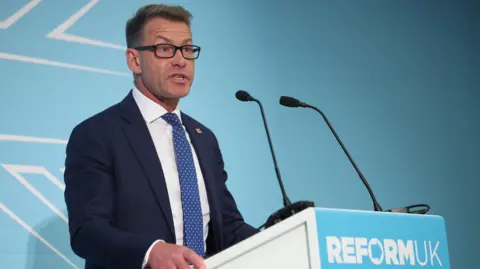 Shutterstock
Shutterstock
David Bull was announced as the new chairman of Reform UK Party
Yusuf used some of the money he made from the deal as a springboard into politics, donating to Reform the following year.
Two days after his resignation as chairman last week, he returned to Reform in a new role. He now focuses on leading its 'Doge' taskforce - which is modelled on US President Donald Trump's Department of Government Efficiency, working on policy and making media appearances.
A new chairman, David Bull, has been appointed in his stead.
At a press conference marking the change, Yusuf was self-depreciating.
"What we need now in a chairman is someone who's an incredible communicator, someone who is loved universally across the party. Loved by the volunteers. Someone who is going to do a better job than me in energising the volunteers on the frontline, he's going to have more time to do it," he said.
Laughing, he added: "I think you'll probably agree he's a more affable and charming man than I am."
He said tweets he had sent criticising the party's only female MP as "stupid" for raising the issue of whether Britain should ban the burka had been misjudged and that he had been "exhausted".
"There was general relief in the professional and voluntary party when he resigned. However, when he came back with a specific task he was given there was great support as well," Towler said.


Sign up for our Politics Essential newsletter to read top political analysis, gain insight from across the UK and stay up to speed with the big moments. It'll be delivered straight to your inbox every weekday.

 3 months ago
80
3 months ago
80









